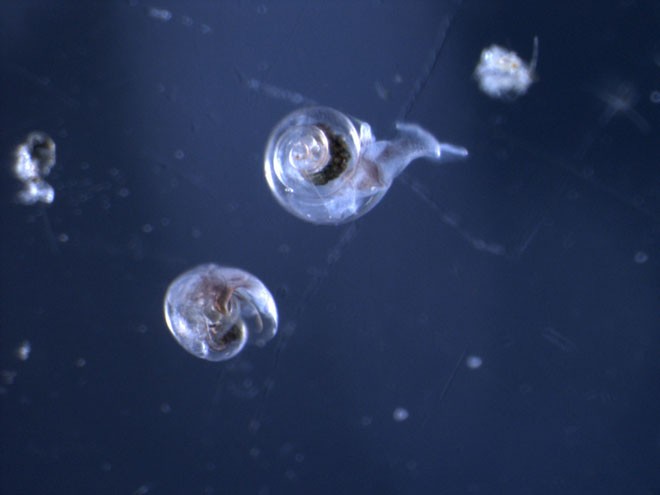Marine snails being dissolved by ocean acidification
by British Antarctic Survey on 28 Nov 2012

The pteropod (marine snail) Limacina helicina antarctica which is abundant member of the Southern Ocean zooplankton community. Specimens mainly inhabit the top 200 m of oceanic waters where they graze on phytoplankton and detritus. Their shells are made of aragonite, a form of calcium carbonate that can dissolve rapidly. Nina Bednarsek
http://www.antarctica.ac.uk/
The shells of marine snails – known as pteropods – living in the seas around Antarctica are being dissolved by ocean acidification according to a new study published this week in the journal Nature Geoscience. These very small animals are a valuable food source for fish and birds and play an important role in the oceanic carbon cycle*.
During a science cruise in 2008, researchers from British Antarctic Survey (BAS) and the University of East Anglia (UEA), in collaboration with colleagues from the US Woods Hole Oceanographic Institution and the National Oceanic and Atmospheric Administration (NOAA), discovered severe dissolution of the shells of living pteropods in Southern Ocean waters.
The team examined an area of upwelling, where winds cause cold water to be pushed upwards from the deep to the surface of the ocean. Upwelled water is usually more corrosive to a particular type of calcium carbonate (aragonite) that pteropods use to build their shells. The team found that as a result of the additional influence of ocean acidification, this corrosive water severely dissolved the shells of pteropods.
Ocean acidification is caused by the uptake of carbon dioxide from the atmosphere emitted as a result of fossil fuel burning. A number of laboratory experiments have demonstrated the potential effect of ocean acidification on marine organisms. However, to date, there has been little evidence of such impacts occurring to live specimens in their natural environment. The finding supports predictions that the impact of ocean acidification on marine ecosystems and food webs may be significant.
Lead author, Dr. Nina Bednaršek, formerly of BAS and UEA, and now of the National Oceanic and Atmospheric Administration (NOAA) says:
'We know that the seawater becomes more corrosive to aragonite shells below a certain depth — called the ‘saturation horizon’ — which occurs at around 1000m depth. However, at one of our sampling sites, we discovered that this point was reached at 200m depth, through a combination of natural upwelling and ocean acidification. Marine snails – pteropods — live in this top layer of the ocean. The corrosive properties of the water caused shells of live animals to be severely dissolved and this demonstrates how vulnerable pteropods are. Ocean acidification, resulting from the addition of human-induced carbon dioxide, contributed to this dissolution. '
Co-author and science cruise leader, Dr. Geraint Tarling from BAS, says:
'Although the upwelling sites are natural phenomena that occur throughout the Southern Ocean, instances where they bring the ‘saturation horizon’ above 200m will become more frequent as ocean acidification intensifies in the coming years. As one of only a few oceanic creatures that build their shells out of aragonite in the Polar Regions, pteropods are an important food source for fish and birds as well as a good indicator of ecosystem health. The tiny snails do not necessarily die as a result of their shells dissolving, however it may increase their vulnerability to predation and infection consequently having an impact to other parts of the food web.'
Co-author, Dr. Dorothee Bakker from the University of East Anglia, says:
'Climate models project a continued intensification in Southern Ocean winds throughout the 21st century if atmospheric carbon dioxide continues to increase. In turn, this will increase wind-driven upwelling and potentially make instances of deep water — which is under-saturated in aragonite – penetrating into the upper ocean more frequent. Current predictions are for the ‘saturation horizon’ for aragonite to reach the upper surface layers of the Southern Ocean by 2050 in winter and by 2100 year round. '
This research was funded by the UK Natural Environment Research Council (NERC) and the European Union Marie Curie Early Stage Training Network.
*Carbon cycle - the method by which carbon is absorbed and released by the ocean.
Upwelling: An oceanographic phenomenon that involves wind-driven motion of cooler, and usually nutrient-rich water towards the ocean surface, replacing the warmer, usually nutrient-depleted surface water.
Aragonite is a crystal form of calcium carbonate that can dissolve rapidly when its saturation in seawater falls below a threshold level. Aragonite saturation generally decreases with depth and the threshold level where dissolution occurs, called the ‘saturation horizon’, is usually reached at around 1000m depth. Ocean acidification has caused this horizon to shallow in modern times. It has been predicted that the saturation horizon may reach the surface across much of the Southern Ocean by 2100.
The pteropod-snail (Limacina helicina antarctica) – is the size of a pinhead (1cm), lives to depths of 200m, and is an abundant species in Southern Ocean waters.
Polar Regions are where ocean acidification effects are most likely to be seen first, since their colder temperatures mean a large susceptibility of the aragonite saturation to the absorption of anthropogenic carbon British Antarctic Survey website
If you want to link to this article then please use this URL: www.sail-world.com/104167